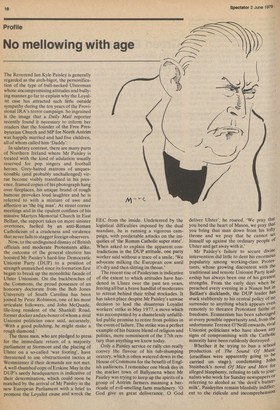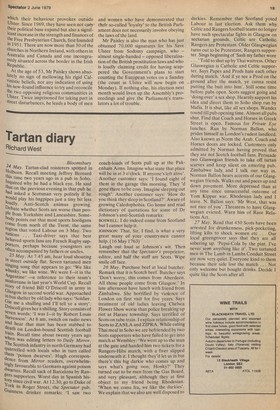Profile
No mellowing with age
The Reverend Ian Kyle Paisley is generally regarded as the arch-bigot, the personification of the type of bull-necked Ulsterman whose uncompromising attitudes and bullying manner go far to explain why the Loyalist case has attracted such little outside sympathy during the ten years of the Provisional IRA's terror campaign. So ingrained is the image that a Daily Mail reporter recently found it necessary to inform her readers that the founder of the Free Presbyterian Church and MP for North Antrim was happily married and had five children, all of whom called him 'Daddy'.
In salutary contrast, there are many parts of Northern Ireland where Mr Paisley is treated with the kind of adulation usually reserved for pop singers and football heroes. Grey-haired matrons of unquestionable (and probably unchallenged) virtue become visibly transfixed in his presence, framed copies of his photograph hang over fireplaces, his unique brand of rough humour provokes loud laughter and he is referred to with a mixture of awe and affection as 'the big man'. At street corner meetings and in the opulent confines of his massive Martyrs Memorial Church in East Belfast, the support takes on more sinister overtones, fuelled by an anti-Roman Catholicism of a crudeness and virulence that never fails to stagger foreign observers.
Now, to the undisguised dismay of British officials and moderate Protestants alike. the outcome of the general election has boosted Mr Paisley's hard-line Democratic Unionist Party (DUP) to a position of strength unmatched since its formation first began to break up the monolithic facade of Ulster Unionism. On the backbenches of the Commons, the proud possessor of an honorary doctorate from the Bob Jones University of South Carolina has been joined by Peter Robinson, one of his most articulate followers, and John McQuade, life-long resident of the Shankill Road, former docker and ex-boxer of whom a rival Unionist politician once said, accurately, 'With a good polishing, he might make a rough diamond.'
The three men, who are pledged to press for the immediate return of a majority parliament at Stormont and the placing of Ulster on a so-called 'war footing', have threatened to use obstructionist tactics at Westminster if their demands are not met. A well-thumbed copy of Erskine May in the DUP's seedy headquarters is indicative of their determination, which could soon be matched by the arrival of Mr Paisley in the new European Parliament with a brief to promote the Loyalist cause and wreck the EEC from the inside. Undeterred by the logistical difficulties imposed by the dual mandate, he is running a vigorous campaign, with predictable attacks on the iniquities of 'the Roman Catholic super state'. When asked to explain the apparent contradictions in the DUP attitude, one party worker said without a trace of a smile, 'We advocate milking the European cow until it's dry and then slitting its throat.'
The recent rise of Paisleyism is indicative of the extent to which attitudes have hardened in Ulster over the past ten years, forcing all but a brave handful of moderates to retreat behind their tribal stockades. It has taken place despite Mr Paisley's unwise decision to lead the disastrous Loyalist workers' strike in May 1977, a move which was accompanied by a shamelessly unfulfilled public promise to retire from politics in the event of failure. The strike was a perfect example of his bizarre blend of religion and politics, more reminiscent of the 17th century than anything we know today.
Only a Paisley service or rally can really convey the flavour of his tub-thumping oratory, which is often watered down in the House of Commons for the benefit of English audiences. I remember one bleak day in the market town of Ballymena when Mr Paisley was trying to keep up the spirits of a group of Antrim farmers manning a barricade of evil-smelling farm machinery. '0 God give us great deliverance. 0 God deliver Ulster', he roared. 'We pray that you bend the heart of Mason, we pray that you bring that man down from his loftY throne and we pray that he cannot set himself up against the ordinary people of Ulster and get away with it.' Mr Paisley's failure to secure divine intervention did little to dent his enormous popularity among working-class Protestants, whose growing discontent with the traditional and remote Unionist Party leadership has always been one of his greatest strengths. From the early days when he preached every evening in a Nissen hut in Belfast's docklands, the DUP leader has stuck stubbornly to his central policy of no surrender to anything which appears even remotely to threaten Protestant faiths or freedoms. Ecumenism has been sabotaged at every possible opportunity and, from the unfortunate Terence O'Neill onwards, rival Unionist politicians who have shown arlY signs of compromising with the Catholic minority have been ruthlessly destroyed. Whetherit be trying to ban a school production of The Sound Of Music (crucifixes were apparently going to be carried on stage), condemning Joh° Steinbeck's novel Of Mice and Men for alleged blasphemy, refusing to talk to journalists who work for Sunday newspapers or referring to alcohol as 'the devil's buttermilk', Paisleyites remain blissfully indifferent to the ridicule and incomprehension Which their behaviour provokes outside Ulster. Since 1969, they have seen not op+ytheir political base expand but also a significant increase in the strength and finances of the Free Presbyterian Church, first founded in 1951. There are now more than 30 of the churches in Northern Ireland, with others in Australia and Canada and one incongruously situated across the border in the Irish Republic.
At the age of 53, Mr Paisley shows absolutely no sign of mellowing his rigid Calvinistic beliefs, nor any indication of using his new-found influence to try and reconcile the two opposing religious communities in Ulster. Twice imprisoned for taking part in street disturbances, he leads a body of men and women who have demonstrated that their so-called '1loyalty' to the British Parliament does not necessarily involve obeying the laws of the land.
Mr Paisley is also the man who has just obtained 70,000 signatures for his Save Ulster from Sodomy campaign, who – almost single-handed – opposed liberalisation of the British prostitution laws and who is loudly claiming credit for having scuppered the Government's plans to start counting the European votes on a Sunday (the count in Ulster will now begin on Monday). If nothing else, his election next month would liven up the Assembly's proceedings and give. the Parliament's translators a lot of trouble.







































 Previous page
Previous page